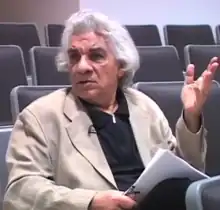Reza Ghassemi
Reza Ghassemi (Persian: رضا قاسمی; born 1949) is an Iranian novelist and musician.
Reza Ghassemi | |
|---|---|
 | |
| Native name | رضا قاسمی |
| Born | 1949 Esfahan |
Life
Ghassemi was born in isfahan. Besides his activities as a writer, he is also involved in exercising classical Iranian music and a master of the Persian lute, the Setar. He has composed songs for the Iranian maestro Shahram Nazeri and been on stage with leading Iranian vocalists, such as maestri Mohammad Reza Shajarian and Sepideh Raissadat.
His best-known composition is the last track on the best-selling classical Iranian album Gol-e Sadbarg, released in 1984. This album, which includes compositions from Jalal Zolfonoun and Shahram Nazeri as well as Reza Ghassemi, is believed to have had the most influential effect on young Iranian artists who initially were reluctant to learn the Setar.
Since the release of Gol-e Sadbarg, the Setar has enjoyed much more popularity among Iranians. Ghassemi and his two famous colleagues, mentioned above, began a new era in Iranian classical music.
Though he lives in France, Ghassemi has not given up teaching Iranian music. Farrokhzad Layegh has studied the Setar with Mr. Ghassemi.
Reza Ghassemi's latest album 14 Cheerful Pieces with the voice of Iranian vocalist Sepideh Raissadat was released on October 25, 2010, in France (by Buda Musique Records).
He has published three novels: Nocturnal Orchestra of Woods (1996), The Well of Babel (1999) and The Spell Chanted by Lambs (2002). Some of his works have been translated into French. The Spell Chanted by Lambs is his first work in English. Reza Ghassemi has also directed an award-winning film In Full Bloom (2019).
Awards
- 2002 Hooshang Golshiri Literary Award, Best First Novel, The Nocturnal Harmony[1][2]
- 2002 The writers and critical award
- 2002 PEKA Award
- 2010 The writers and critical award
Albums
- 14 Cheerful Pieces (rel. Oct. 2010)
- Dashti-Mahour (rel. 1992)
- Improvisation in Esfahan – Rast Panjgah
- Siavash Khani (Chahargah)
- Gol-e Sadbarg (rel. 1984)
Publications
- Reza Ghassemi, 1996 - Nocturnal Orchestra of Woods
- Reza Ghassemi, 1999 - The Well of Babel
- Reza Ghassemi, 2002 - The Spell Chanted by Lambs
References
- Shataw Naseri (June 5, 2014). "Houshang Golshiri Awards". The Parsagon Review. Retrieved July 5, 2015.
- Syma Sayyah (December 13, 2002). "Winners of Golshiri Foundation's Second Annual Literary Awards Announced". Payvand Iran News. Retrieved February 25, 2013.